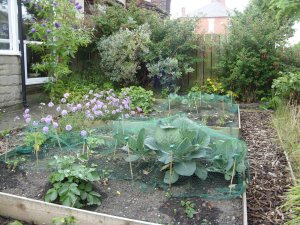Delighted to have a guest blogger! Lucy who was on the Food Programme:
Continuing along the theme of food cooperatives, I am going to write a bit about my experiences and thoughts as a member of South Birmingham Food Coop.
SBFC is not a football club, but a collection of around twenty households that place an order with the cooperative distributor Suma each month. After emailing the designated coordinator for that month with our choices from the online catalogue, we deposit our money into the SBFC bank account and wait for our orders to be delivered to a member’s house. On delivery day orders are sorted into piles and collected. Simple!
And it is pretty simple. Of course sometimes the money doesn’t match up exactly, the right things aren’t delivered or someone forgets it is delivery day. But the benefits of buying collectively and side-lining the evil that are supermarkets makes it well worth it.
But this blog entry is not about why supermarkets are awful (huge profits taken away from community, destroying local small business, driving down the price to their dairy suppliers until making milk only works on an industrial scale), but why food cooperatives are a constructive, doable alternative.
Firstly, we have greater control over where our food comes from. Buying collectively means we are able to order through distributors such as Suma who are themselves a cooperative with strong ethical and environmental principles. It also allows us to approach local producers directly – in Birmingham we have access to local honey, milk, cheese and spices. The North East is just as bountiful with a range of local food networks which already exist.
Most of what we buy are staples – rice, pasta, washing up powder, coffee – which we buy in bulk. This reduces packaging and drives down the price for our members. Affordability is important to us as we want SBFC to be a viable alternative to the supermarket, not a luxury that only those on a comfortable income can enjoy.
From this initial setup things can grow, as is happening with SBFC. One of our members runs the community bakery and social enterprise Loaf. In May Loaf and SBFC are opening a shop on Stirchley’s (currently pretty dilapidated) high street. This will be run by and for the community, it will provide a place to discuss local issues and share ideas. It will help us to draw more members of the community into the political issues that surround food; this is especially pressing when two new supermarkets are planned for Stirchley in the next year.
Ok, hopefully I’ve convinced you that food coops are a good thing. If you’re lucky you may live next to an existing one, use Sustain’s food cooperative finder to check. If not, then consider starting your own. Call a local meeting, leaflet for an afternoon and see who attends – that’s how we started. There is loads of support for food cooperatives from initiatives such as Cooperatives UK. Recommended reading would include the ‘Food Co-ops Toolkit‘ which outlines the initial steps.
For me this is all about doing things for ourselves instead of buying into things we don’t agree with. I don’t want to screw people over when I buy food and working cooperatively with other people helps me to avoid this. SBFC is itself part of a larger network of community projects in Stirchley which help to take control back from big business and into the community, where it belongs.
Lucy
